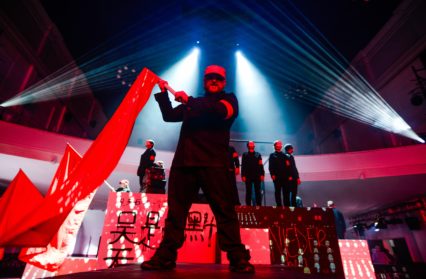Steph Power is at the Memo Arts Centre in Barry to review the WNO Youth Opera’s production of Kommilitonen.
During the 2010 student protests against university tuition fees, I remember being in King’s College, London and looking out the window to see a crowd gathering in the Strand. Next to me was a young post-graduate from Greece who remarked how we in the UK were hopeless at demonstrating: ‘If this were Athens,’ she said, ‘everyone would be out on the streets: the cleaners, the caretakers, parents, professionals – everyone who values the importance to democracy of a free, universal education.’ My response was that it was good that students, at least, were being roused from an apparent political slumber, if only motivated by self-interest on this occasion.
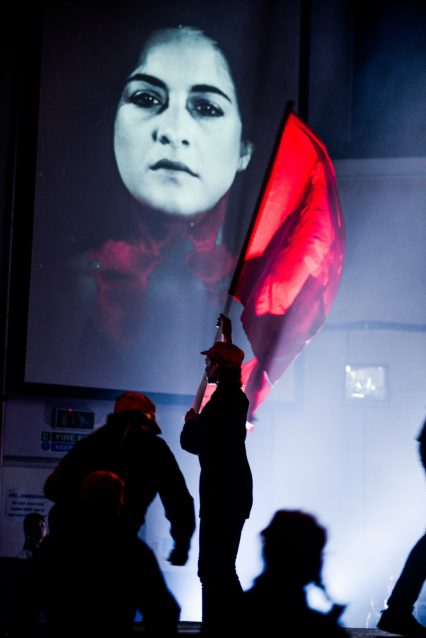
But of course, not all student activism is or has been to the socio-political good, as the late Peter Maxwell Davies’ penultimate and newly topical opera, Kommilitonen!, makes clear. The composer of seminal ‘60s and ‘70s music theatre in which an avant-garde spirit mirrored the anti-establishment tumult of the times, Max had publicly avowed that the 1999 Mr Emmet Takes a Walk would be his last work for the stage. So we can be thankful that, a decade or so later, the Royal Academy of Music reignited his interest with a request to write an opera for students and young people: just the kind of project that would be close to his heart. One of his terms was that David Pountney, the librettist and original director of Emmet and a previous opera, The Doctor of Myddfai, would be brought on board.
Where Myddfai interweaves myth and medicine within a fictional totalitarian setting, Kommilitonen! is rooted in real-life 20th-century dictatorships and systems of oppression. These are historical, but their consequences are still with us and resound with warnings, as director Polly Graham’s brilliant, explosive new production for WNO Youth Opera eloquently implies. Pountney writes that the opera is ‘not only for students but about students’. It entwines three contrasting worlds of Maoist China, Nazi Germany and segregation-era America, recounting the stories of students who either swallowed or refused the propaganda they were fed, with tragic and/or uplifting results. The conclusion is laudably, if not persuasively, optimistic, and we leave chilled as well as humbled, and ultimately energised; an impressive achievement on the part of the WNOYO team, who leave us no room for denial in the face of today’s rising extremism, sloganeering demagogues and zombie-xenophobia.
Graham and her exceptional cast and creative team swept us into their visceral production in the round. We moved freely about the space, becoming implicated in a fast-moving drama which questioned the whole notion of ‘innocent bystander’. There were some brief, direct interactions. I was offered a piece of chalk, for instance; a potent weapon for good or ill in a climate of proscribed thinking. The atmosphere was one of electrical charge between musicians, singers and audience, in which the lines between each became blurred, and yet strongly etched. Consciously or otherwise, in the operatic blank-slate environs of Barry’s Memo Arts Centre, the echoes of Graham Vick’s recent warehouse staging of Tippett’s The Ice Break were profound – and Kommilitonen! was all the better for it; shown in a light that made the most of its already sure marriage of ensemble spectacle and individual story, deft musical polystylism and documentary punch.
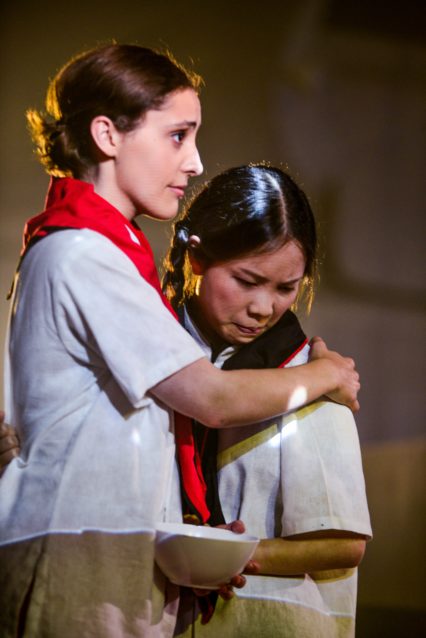
Titled for a pamphlet distributed by the courageous young anti-Nazis, Der Weiße Rose, WNO prefers the translation ‘Young Blood’ to the literal ‘Fellow Students’. Their phrase reeks appropriately of violence in each of the historical juxtapositions, with shocking threads nonetheless in common: the Scholls and their comrades are caught and executed whilst Chinese siblings Wu and Li literally sacrifice their own parents in the name of cultural revolution. More happily, James Meredith defies the lynch mobs to become Mississippi’s first black university graduate.
Max’s score, superbly conducted by Alice Farnham, brims with invention and humanity. Joined by student musicians from the Royal Welsh College of Music and Drama and elsewhere, the WNO orchestra sat on the stage while a marching band, honky-tonk piano and lone Chinese erhu variously joined the student singers and audience on the floor below. Together, the performers delivered a whirling mix of civil rights songs and spirituals, atonal chorales, pleading arias, and martial music of a Red Army-inspired, almost Ivesian, blaring dissonance. All was sung and enacted with passionate commitment by the large, agile cast amongst whom I detected not a single weak link (this is a strongly ensemble piece, but Chiara Vinci was vocally striking as Sophie Scholl). Movement director Jo Fong deserves special praise for the sheer discipline of the timing, making potentially confusing scenes crystal clear as performers surged amongst us, in and out of the hall through its numerous doorways.
The action centred on a horizontal black cross made of odd-sized cubes, forming a 4-directional ‘stage’ with sacrificial Christian overtones, and which became chalked with protest slogans. Images of a giant typewriter confirmed a broadly mid-century period setting before we were plunged into a multi-media sensory and propaganda assault. There were a welter of political and literary references: chunks of text were projected by video onto the set while two screens (with surtitles) either side of the orchestra alternated newsreel-type footage and stylised images of political rallies. Frozen close ups of the Scholls and others showed the terror that they must have felt – and acted in spite of.
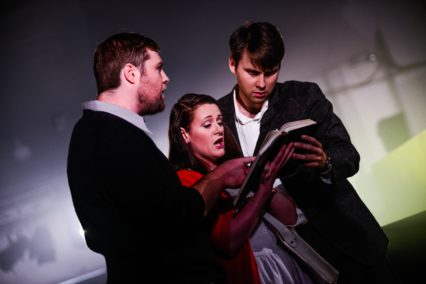
Orwell, Dostoevsky, Goethe: words from these writers and more passed by within a dynamic aural and visual framework dominated in colour by gaunt black, white and red. In costume and textual symbolism we had the red flag, the Red Guard and the Little Red Book; the spilling of blood and its counter, life; the Black Hand and Blackshirts; the oppression of black people by white; non-violent protesters, The White Rose; the whites of frightened, mesmerised eyes. Above all, there was the danger – couched in red – of seeing things in simplistic black and white terms. Cleverly, specific symbolism was eschewed; there were no swastikas or hammers and sickles, for instance, leaving us little room to deny the universality of the scene, and to demur that these and other such horrors were perpetrated by those others back then, and could surely never be replicated by us, now or in the future.
For if that were true – even without the evidence of atrocities committed by authorities in the UK and elsewhere in our name – there would be no need for ‘Black Lives Matter’ protests, nor the designation ‘hate crime’ – nor even the need to voice disquiet over ‘no-platforming’ and the suppression of free speech on today’s university campuses. As Graham writes in her introduction, ‘choosing to be silent can often be as strong as standing up and shouting “No”!’ But which do we opt for and why? Would we have the courage to recognise what was needed at the critical moment, and to take the appropriate action regardless of collective will?
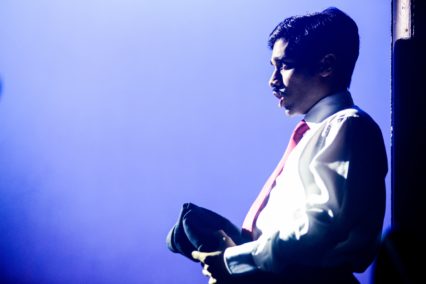
In this context, the figure of James Meredith (sensitively portrayed by Oscar Castellino) was particularly striking. In the opera as in life, he cut a lone but never lonely figure, determined on a course of action which called the collective to account on all sides. Several times during the performance I found myself standing next to him as, unlike the other characters who rushed to and fro when not centre-stage, he quietly observed proceedings in those other worlds. It made me reflect on the importance of critical thinking – education! – and the power of the individual to effect change beyond the seething mass.
Such ideas might appear obvious, or even naive, to the intellectual classes. But how many of them would be able to stand up as Meredith did and risk opprobrium from all sides in pursuing a course which liberated not only himself but swathes of others whose collective actions had thus far failed? All credit to Max and to Pountney for bringing his and the others’ stories to our attention in such thought-provoking ways – and of course to the WNO Youth Opera for so stunningly bringing it all to life. This has got to be one of the operatic events of the year – and surely one of the most moving and powerful tributes to Max to be encountered anywhere.
Kommilitonen! – Memo Arts Centre, Barry, 28 July 2016
Music – Peter Maxwell Davies
Libretto – David Pountney
Conductor – Alice Farnham
Director – Polly Graham
Designer – Gabriel Slade
Movement Director – Jo Fong
Cast (on the 28th) includes: William Rennie / Oscar Castellino / Chiara Vinci / Aaron Holmes / Dragos Ionel / Andrew Irwin / Dafydd Gape / Christine Byrne / David John Phillips / Harim Oh / Grace Wyatt / Suzi Saperia / Héloïse Werner / Children’s Chorus
All photos: credit Kirsten McTernan


